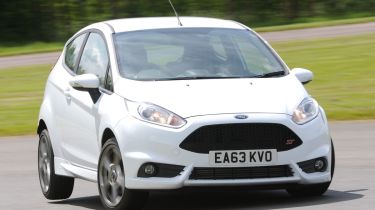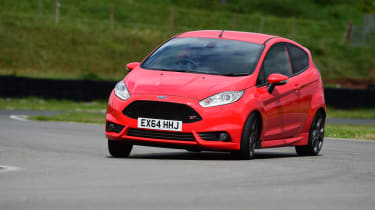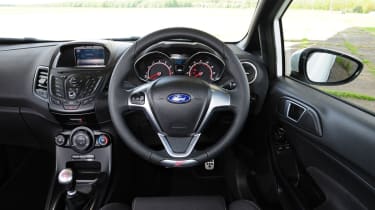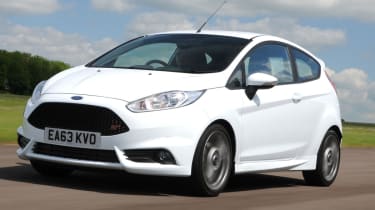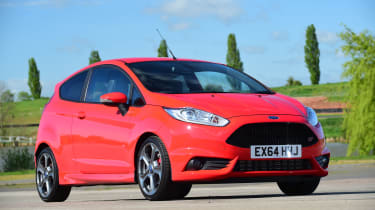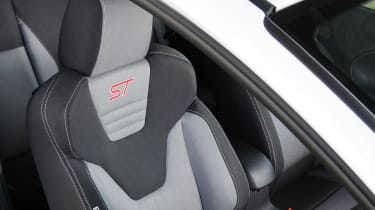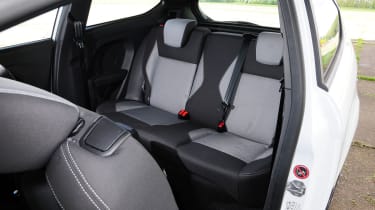Ford Fiesta ST (2013-2018) review
The Ford Fiesta ST hot hatch offers a sweet drive, good looks and great value

The Ford Fiesta ST launched in 2013 is powered by a 1.6-litre EcoBoost turbocharged engine, delivering 180bhp through the front wheels, although 197bhp is available on ‘overboost’. It was the first Fiesta to gain torque-vectoring technology, while Ford lowered the suspension by 15mm and fitted rear disc brakes – another first in Fiesta.
Throw in a pair of figure-hugging Recaro sports seats and a sports exhaust and the results are little short of sensational. On a British B-road, the Fiesta ST is able to keep up with many an illustrious performance or sports car, even with ‘just’ 180bhp on tap. The potential for giant-killing in the Fiesta ST is huge.
In 2016, Ford introduced a guaranteed future classic in the form of the limited edition Fiesta ST200. Limited to 400 units, unless there’s a demand for more, the ST200 commands a £3,000 premium over the ST-3, but delivers even more power, a host of mechanical upgrades and bespoke paint.
Power is increased to 197bhp, or as much as 212bhp on ‘overboost’, while Ford has also tweaked the gearbox, steering, damping anti-roll bars and the ESP system. It looks good value, until you discover what Mountune can do for less money.
Used - available now

2021 Skoda
Enyaq
25,012 milesAutomaticElectric
Cash £18,500
2022 MG
HS
3,750 milesAutomaticPetrol1.5L
Cash £19,100
2021 Kia
Ceed
22,212 milesManualPetrol1.0L
Cash £13,000
2022 Kia
Sportage
26,692 milesAutomaticDiesel1.6L
Cash £23,000Chuck the aftermarket tuners some cash and they’ll deliver as much as 227bhp and it will have no impact on the manufacturer’s warranty. It’s all thanks to a relationship between Mountune Performance and Ford which dates back to 2008.
Ford’s history of delivering hot Fiestas goes back even further, to the 1.3-litre Supersport and 1.6-litre XR2 of the early 80s, through to the XR2i, RS Turbo and original ST of 2004. There’s little doubt that the current ST is the best of the breed.
As the current Fiesta prepares to make way for the new model, the Fiesta ST range has been trimmed, with the ST-1 consigned to the history books. The range kicks off with the ST-2, which features heated part-leather Recaro front seats, DAB radio, rear privacy glass and a start button.
The ST-3 adds satellite navigation, keyless entry, cruise control, automatic headlights, rain-sensing wipers, auto-dimming rear-view mirror and power-folding door mirrors. The ST-2 and ST-3 models have always been the most popular, which means ST-1 examples are rare on the used car market.
The limited edition ST200 is the flagship of the range, featuring Storm Grey paint, a full bodykit, unique 17-inch alloy wheels, lowered suspension, shorter gear ratios and a host of upgrades. In 30 years time, the ST200 will be the model attracting the crazy bids at a classic car auction.
Rather flippantly, we’d say that the Ford Fiesta ST has no direct rivals, but in terms of size it goes up against the Renaultsport Clio, Vauxhall Corsa VXR and Peugeot 208 GTi. The fact that it undercuts the pair in terms of price is the icing on the cake. Other competitors include the MINI Cooper S and Audi S1.
The Ford Fiesta ST is, quite simply, the best small hot hatch you can buy. In fact, it’s arguably one of the greatest hot hatches of all-time, to be ranked alongside the likes of the Peugeot 205 GTi, Renault Clio Williams and Mk1 Golf GTI.
It has been the benchmark supermini hot hatchback since its launch in 2013, offering brilliant handling, blistering performance and exceptional value for money. We’ve run out of superlatives and its rivals have given up trying to beat it, which is impressive stuff for a car that's due to be replaced. The next Fiesta ST has a tough act to follow.
Engines, performance and drive
From the moment you lower yourself into the Ford’s figure-hugging Recaro seats, grip its chunky three-spoke steering wheel and place your feet on its perfectly spaced pedals, you know this is a car that puts the driver at the centre of the action.
At the heart of the ST’s appeal is its sublime chassis. Retuned suspension dampers and faster steering mean its limits are raised dramatically over the standard car’s, but despite its hardcore approach, the Ford always feels accessible. Turn-in is sharp, and the ST locks on to a cornering line, but it’s so balanced that quick direction changes are incredibly stable, aided by a neat torque vectoring system that subtly brakes individual front wheels to eliminate understeer.
On the track, this means the Fiesta can carry more speed through corners, and this translates on to the road, where the precision and grip give you the confidence to drive harder. It also benefits from well weighted controls which provide just the right amount of feedback.
It has a great-sounding engine, with a delicious rasp that makes you want to rev it harder. This is paired with a brilliant six-speed manual gearbox, which features a precise, short-throw shift action.
Settle down to a gentler pace, though, and the Ford takes on a more subdued role. The suspension is firm, but the smooth, controlled damping means long-distance journeys are more comfortable than in the jarring Vauxhall Corsa VXR, although the car’s low-profile tyres do produce some intrusive road roar at higher speeds.
Engines
The Fiesta ST is powered by a 180bhp 1.6-litre turbocharged petrol engine, or at least that’s what the brochure says.
In fact, once you’re out of first and second gears the engine makes 197bhp under full throttle, thanks to an ECU that allows the turbo to spin faster for limited periods of ‘overboost’. This is available for 15 seconds a hit – quite a long time on the average British B-road. You’ve only got to lift for a moment to restart the timer, too, so in real-world driving the full 197bhp is available pretty much whenever you want it.
The Fiesta has a top speed of 139mph and the 0-62mph sprint time is only 6.9 seconds as a result.
If you want even more power, Ford's accredited tuner, Mountune, offers an upgrade to 212bhp. It consists of a modified airbox and filter, plus changes to the engine management computer. Nothing else is touched and the Ford warranty is unaffected. While the upgrade will cost you £799, in our eyes it’s money well spent. The 0-62mph time is cut by half a second to 6.4 seconds and there’s more torque in the mid-range to further beef up response.
Ford also offers its own in-house upgrade in the form of the limited run ST200. Designed to celebrate the success of the standard car, the ST200 gets 197bhp and 290Nm of torque, while an overboost function increases these figures to 212bhp and 320Nm for 20 second bursts. As a result the 0-62mph time is reduced to 6.7 seconds and the top speed rises to 142mph. It's a limited run model, however, and commands a sizeable premium over the already sweet-handling standard car.
MPG, CO2 and Running Costs
Like any performance car, the harder you drive, the greater your motoring expenses will be. Ford claims 47.9mpg for the Fiesta ST three-door and 46.3mpg for the five-door, but this will soon plummet once you hit your favourite back road, or take the car on track. That said, the Fiesta’s consumption figures are bang in the middle of class rivals.
The showroom sticker prices are typically more enticing, though. In three-door form, the ST-2 costs £19,215, and while the range-topping ST-3 trim carries a £1,000 premium over the ST-2, the Fiesta still remains better value than the Renaultsport Clio and Peugeot 208 GTi. Five-door models start at £19,800 for the ST-2 – that’s a £585 premium over the three-door – while the range-topping ST-3 five-door costs £20,800.
The ST200 is a limited-run model: just 400 were initially earmarked for the UK but high demand increased the number available to as high as 1,000. The ST200 weighs in at a hefty £23,215, which is £3,000 more than the ST-3 three-door (the ST200 is only offered with three doors). You could argue you get more performance for the money, but Mountune's factory approved tuning kit costs just £799 plus fitting and delivers similar pace for the excellent ST. Fit a Mountune Racing upgrade at a Ford dealership and you'll maintain Ford's manufacturer warranty.
In all cases, Ford is offering promotional prices across the Fiesta ST range, with discounts of £1,000 available. As we edge closer to the launch of the new model, you should be able to haggle for more. Be warned: there’ll be limited stock available as factory orders have closed.
Once the Fiesta ST is parked in your driveway, it remains affordable fun as most consumables are the same price as on the standard supermini. But remember to budget for extra wear on pads, discs and tyres if you plan to do track days – and given how entertaining the Fiesta is to drive, it’d be a shame not to.
Considering its impressive performance potential, the Ford’s CO2 emissions are surprisingly low, which makes it a cost effective choice for company car users. The three-door model emits 138g/km, which results in a first year rate of £200 and £140 for each year thereafter, puts the Fiesta ST in VED band E, so a year’s road tax will cost £130 - the same as owners of the SEAT Ibiza Cupra, Peugeot 208 GTi or MINI Cooper S will pay. It’s the same price for the five-door version, which emits 141g/km CO2. However, opt for a five-door and emissions rise to 141g/km, which puts it in band F, costing £145 a year.
Insurance groups
You don’t expect to buy a hot hatch and not take an insurance hit, but things have certainly improved over the years. In the late nineties, cover providers got fed-up with having to pay out on stolen GTis, and virtually killed the hot hatch by pricing drivers off the road. Nowadays, significantly improved safety and security have made hot hatches from all makes much less of an insurance liability. So if you’ve got a reasonable driving record, the Fiesta ST’s Group 30 rating isn’t too outrageous. Even the limited-run ST200 fits into the same bracket. For the sake of comparison, the 180bhp SEAT Ibiza Cupra sits in insurance Group 27.
Depreciation
You can reckon on a new Fiesta ST retaining 45 per cent of its original purchase price if you sell after three years and 36,000 miles. Our experts say that makes it a slightly better investment than a SEAT Ibiza Cupra, for example, and a bit worse than a MINI Cooper S – but then the MINI has more of a premium brand feel and is more expensive to buy when new.
Interior, design and technology
The standard Fiesta is one of the most stylish superminis, so Ford hasn’t had to work too hard to transform it into a muscular pocket rocket.
The design changes really stand out, though. At the front, there’s a larger mesh grille with a deeper front bumper, while the standard car’s sleek, swept-back headlamps give the ST an aggressive look. LED daytime running lights add a final flourish. On models with the Mountune upgrade, a subtle yellow Mountune badge at the rear hints at the car’s enhanced performance potential.
Buyers wanting to make an even bigger impression can add the £275 ST Style pack, which includes a dark-grey finish for the 17-inch alloys. While the standard silver rims fill the bulging wheelarches perfectly well, the darker wheels increase the Fiesta’s visual presence and give it a more aggressive stance. Red brake calipers (also part of the ST Style pack, along with illuminated ST sill plates), a large boot spoiler, a deeper rear bumper and twin exhaust tailpipes complete the racy makeover.
Inside, the ST's changes are less obvious, with metal pedals, bright red flashings for the part-leather Recaro seats and revised dials the only highlights. The bespoke instruments are much easier to read than in the regular car, which is welcome.
ST200 models are identified by their unique SVO Storm Grey paint, two-tone 17-inch alloys and bespoke badging. You also get part leather seats, silver accents for the seatbelts and an ST200 badge set into the centre console ahead of the gearlever. The £3,000 premium over the ST-3 seems a lot to ask, but such is the price of exclusivity in this day and age.
Our money would go on an ST-2 version, but top-spec ST-3 models are well equipped – adding cruise control, heated seats, keyless go and sat-nav all as standard. However, the interior is let down by its fussy layout and the small infotainment screen that’s set too far back in the dash. And while the cabin is robustly built, it’s not as upmarket as those in rivals like the MINI Cooper S and VW Polo GTI.
Sat-nav, stereo and infotainment
The infotainment system gives away the age of the Fiesta. Despite the facelift, the set-up is let down by a 4.2-inch screen that’s too small and recessed too deeply for comfortable use, plus menus that could be more slick to navigate. Still, given the Fiesta ST’s focus on entertaining the driver, this perhaps isn’t as much of a setback as it might be in the rest of the Fiesta range. Features available on the car include MyKey, which allows owners to set speed and audio volume limits and ensure safety features are not disabled when loaning the vehicle to other drivers. There’s also Ford’s voice-activated connectivity system, called SYNC.
Practicality, comfort and boot space
Although it’s a performance model, underneath the skin the ST is just a three-door Fiesta. This means that it still retains a useful boot, and rear seat space isn’t compromised too much more by the chunky Recaro front seats. Even so, the standard Fiesta is by no means the pick of the crop if you’re looking for maximum interior space.
As with the standard models, there's plenty of useful storage for odds and ends, including a large glovebox, deep door bins and numerous cup-holders.
Engine noise is well suppressed at 70mph, too, making the ST a comfortable car to drive longer distances. However, the addition of a larger engine and six-speed gearbox has increased the Ford's turning circle, so it can be hard work in crowded car parks.
Size
As you’d expect, the Ford Fiesta is all about hitting the class averages when it comes to dimensions – at 3,969mm long, it’s a bare 1mm shorter than the VW Polo GTI, and 7mm longer than the Peugeot 208 GTi. The Ford is about 30mm higher than both, and the biggest variance is width, where the 1,722mm-wide Ford compares to the 1,682mm VW and 2,004mm Peugeot.
It’s a similar story inside, where the trio’s passenger compartments are all within a few millimetres of each other for elbow and leg room.
Leg room, head room & passenger space
The bulky nature of the sports front seats makes life slightly difficult when climbing in and out, particularly for rear passengers in the three-door model. If you need to fit child seats, there are standard Isofix mounts in the back, but we’d recommend the five-door ST for families – the chunky Recaro seats really get in the way when fitting child seats in the three-door version.
Head and legroom is also limited for adults sitting in the rear, as it is in the standard Fiesta, but it’s fine for children.
Still, things look better up front. The seats are set nice and low and are very comfortable, even if the firm ride takes the edge off comfort slightly.
That said, the driving position is usefully adjustable, with a seat that goes up and down, as well as a steering column that tilts and slides.
Boot
The Fiesta ST has a practical 290-litre boot space, and while the 60:40-split rear seats don’t lie fully flat, when they’re folded this capacity increases to 974 litres. Opt for a space-saver spare wheel – which we’d recommend over the pressurised can of puncture gunk that Ford supplies as standard – and boot space with the seats up is cut to 276 litres.
For the sake of comparison, the boot space with the seats in place/folded down is 280/952 litres for the VW Polo GTI and 285/743 litres for the Peugeot 208 GTi.
Reliability and Safety
The Fiesta is the UK’s best-selling car and has been in production for almost eight years, so niggles should be few and far between. That said, it's showing its age and this was reflected in its showing in this year's Driver Power owner satisfaction survey, in which the popular Ford finished in the second half of our table.
Less impressive is the brand’s dealer network, which placed a lowly 27th out of 32 in our 2016 poll. On the plus side, if your Fiesta does go wrong in any way, you won’t have to travel far to get it fixed as Ford has 781 garages across the country.
Standard safety equipment is generous, and includes seven airbags and Ford’s intelligent MyKey set-up, which allows parents of younger drivers to limit the car’s top speed and radio volume, plus make sure that any electronic safety systems cannot be overridden.
The brakes are more powerful than on other models in the Fiesta line-up, too, although unlike some other versions, the ST isn’t available with the option of autonomous emergency braking.
Still, the safety package is comprehensive enough, and the crash performance sufficiently strong, for Euro NCAP to have awarded the Fiesta a five-star rating after testing.
Warranty
If a Ford Fiesta ST with the Mountune tweaks is your thing, but the idea of aftermarket upgrades makes you nervous, you needn’t worry, as many of the packages are covered under Ford's manufacturer warranty. Thanks to its long-running relationship with Mountune, Ford officially approves the modifications, which is a strong indication that reliability shouldn’t be affected. You can get the upgrades fitted to your ST at one of 150 approved dealers, and in the first five months over 500 owners bought the Mountune pack.
The standard Ford warranty term applies, and it’s the old industry standard of three years/60,000 miles. You can do better elsewhere – for example, four years’ cover is offered on the Renaultsport Clio. The Ford only comes with 12 months’ breakdown cover, and there’s a one-year paint warranty and 12-year ‘perforation’ warranty should your Fiesta rust right through.
Servicing
Unlike many of its competitors, the Fiesta isn't available with a fixed-price servicing package. However, as Ford is a mainstream brand, you shouldn’t expect heavy charges for dealer maintenance – an interim check-up will set you back around £125, while a main service will be closer to £200.
